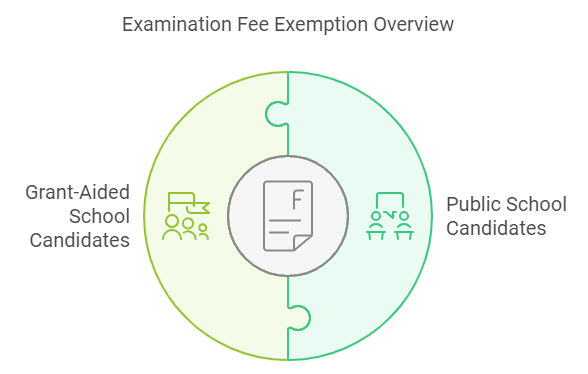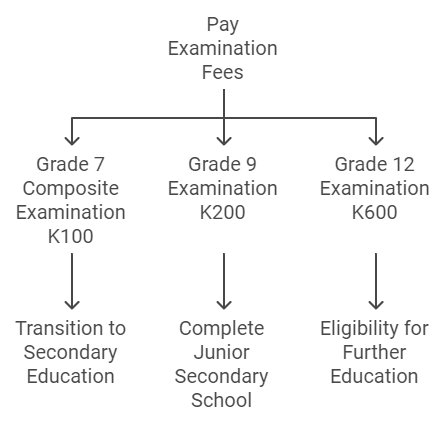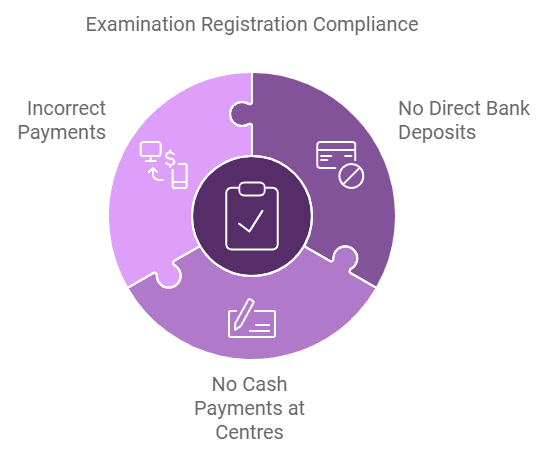Since the United Party for National Development (UPND) came into power, the Zambian government has made strides in improving access to education, particularly by introducing free education in public and grant-aided schools.
One of the significant outcomes of this policy as implemented by the Examination Council of Zambia (ECZ), is the relief it brings to parents and guardians who are no longer required to pay school fees. However, when it comes to examination fees, there are specific guidelines regarding who is exempt and who must pay.
Shop laptop & School bags
Check out top-quality laptops and stylish school bags at Zed PCs – perfect for work, study, and on-the-go convenience! Shop now and find unbeatable deals on the essentials you need. For more information, don’t hesitate to get in touch with the website directly. Come one, come all.
This guide will break down the fee structure and payment processes for all candidates, including those attending private schools and those registering for external exams such as the General Certificate of Education (GCE).
Who Is Exempted from Paying Examination Fees?

The Zambian government has announced that candidates in public schools and grant-aided schools will no longer be required to pay examination fees.
This is a direct result of the free education policy, aimed at providing every student in these institutions with an equal opportunity to sit for exams without financial barriers. Here’s what this means for specific categories of students:
- Public School Candidates: All students attending public schools across Zambia are exempt from paying examination fees. Public schools are fully government-funded, and under the new policy, all examination-related costs for students in Grades 7, 9, and 12 are covered.
- Grant-Aided School Candidates: Grant-aided schools, which are partially funded by both government and private entities (such as churches or non-governmental organizations), will also benefit from the same exemption. Students attending these schools will have their examination fees waived, provided they meet all the other registration criteria.
Shop laptop & School bags
Check out top-quality laptops and stylish school bags at Zed PCs – perfect for work, study, and on-the-go convenience! Shop now and find unbeatable deals on the essentials you need. For more information, don’t hesitate to get in touch with the website directly. Come one, come all.
This decision is expected to encourage more students to remain in school and sit for their examinations, particularly those from economically disadvantaged backgrounds.
Examination Fees for Private School Candidates

While public and grant-aided school students benefit from fee waivers, students attending private schools are still required to pay examination fees.
These fees are intended to cover the costs associated with setting and marking the exams, as well as administering them. Below is a breakdown of the fees that private school candidates must pay:
- Grade 7 Composite Examination: K100
This examination is a key milestone for Grade 7 students, who must pass it to transition to secondary education. - Junior Secondary School Leaving Examination (Grade 9): K200
The Grade 9 examination is a crucial step for students as they complete junior secondary school and prepare to either continue their education or pursue vocational training. - School Certificate Examination (Grade 12): K600
The Grade 12 examination, also known as the School Certificate Examination, marks the end of secondary education. It is one of the most important exams in the Zambian education system, as it determines a student’s eligibility for further education at universities or colleges.
The examination fees for private school candidates are designed to maintain the quality and integrity of the exam process.
Shop laptop & School bags
Check out top-quality laptops and stylish school bags at Zed PCs – perfect for work, study, and on-the-go convenience! Shop now and find unbeatable deals on the essentials you need. For more information, don’t hesitate to get in touch with the website directly. Come one, come all.
Private schools, though not funded by the government, must still meet the standards set by the Examinations Council of Zambia (ECZ) in the administration of these exams.
Examination Fees for External and GCE Candidates

In addition to students attending formal schools, many candidates register for external examinations or the General Certificate of Education (GCE).
These exams are typically taken by those who want to improve their grades or obtain certification outside of the formal school system. Here is a breakdown of the fees for external candidates:
- Grade 9 External Examination: K50 per subject
External candidates sitting for the Grade 9 exams must pay K50 per subject. It’s important to note that the entry fee has been removed, making it easier for students to register without the extra financial burden. - General Certificate of Education (GCE) Examination: K200 per subject
Candidates for the GCE exams, which are equivalent to the Grade 12 examinations, must pay K200 per subject. The GCE exams offer a second chance for those who may have missed or failed to pass their Grade 12 exams initially.
Shop laptop & School bags
Check out top-quality laptops and stylish school bags at Zed PCs – perfect for work, study, and on-the-go convenience! Shop now and find unbeatable deals on the essentials you need. For more information, don’t hesitate to get in touch with the website directly. Come one, come all.
The removal of the entry fees for both Grade 9 External and GCE examinations is a significant development, aimed at making these opportunities more affordable for a larger number of people.
Approved Payment Methods for 2024 Examinations

To ensure a smooth and efficient process for the payment of examination fees, the Examinations Council of Zambia (ECZ) has implemented specific payment channels.
These channels are designed to provide a variety of options that cater to the needs of different candidates, whether they are in urban or rural areas. Here are the payment methods available:
- Payment Gateway: The ECZ has set up an official payment gateway accessible at systems.exams-council.org.zm. This portal allows candidates to make payments using Airtel Mobile Money, MTN Mobile Money, Zamtel Kwacha, and VISA debit or credit cards. This is an easy and secure way to pay, especially for candidates with access to digital payment platforms.
- ZANACO Branches: Candidates can also make payments at ZANACO bank branches through the Bill Muster service. When making a payment at ZANACO, candidates should use the Institutional ID 6184, which is designated for ECZ exam fees. This method provides an option for those who prefer over-the-counter banking transactions.
- ATLASMARA: Another option is ATLASMARA, which accepts payments through Airtel Mobile Money, MTN Mobile Money, and the School Pay Website. These options are designed to provide convenience for those using mobile payment systems, which have become widely popular across Zambia.
Shop laptop & School bags
Check out top-quality laptops and stylish school bags at Zed PCs – perfect for work, study, and on-the-go convenience! Shop now and find unbeatable deals on the essentials you need. For more information, don’t hesitate to get in touch with the website directly. Come one, come all.
Important Guidelines to Note

To ensure that the examination registration process runs smoothly, candidates and parents must adhere strictly to the following guidelines:
- No Direct Bank Deposits: Direct deposits into any of the ECZ’s bank accounts are not allowed. This policy helps prevent errors in registration, such as payments not reflecting on the system, which could lead to students being left off the paid register. To avoid this, use the approved payment methods only.
- No Cash Payments at Examination Centres: Cash payments will not be accepted at examination centres under any circumstances. All transactions must be conducted through the digital or banking channels mentioned above. This is part of ECZ’s effort to ensure transparency and accountability in fee collection.
- Incorrect Payments: If payment is made incorrectly or through channels not approved by the ECZ, the registration process will remain incomplete. The ECZ has made it clear that they will not entertain any claims regarding wrongly deposited fees, so it is critical that both parents and candidates double-check the payment method and amount before proceeding.
Shop laptop & School bags
Check out top-quality laptops and stylish school bags at Zed PCs – perfect for work, study, and on-the-go convenience! Shop now and find unbeatable deals on the essentials you need. For more information, don’t hesitate to get in touch with the website directly. Come one, come all.
Conclusion
The new guidelines on examination fees, combined with the government’s policy of free education in public and grant-aided schools, represent a significant step towards making education more accessible to all Zambian students.
However, for candidates in private schools and those taking external or GCE exams, it is essential to be aware of the required fees and payment methods. Following the correct procedures will ensure a seamless registration process and allow students to focus on their studies and exam preparation.
By adhering to these guidelines and using the approved payment channels, candidates can avoid unnecessary complications and secure their place on the examination register. This ensures that every student, regardless of their educational background, has the opportunity to take their exams and move forward on their educational journey.







